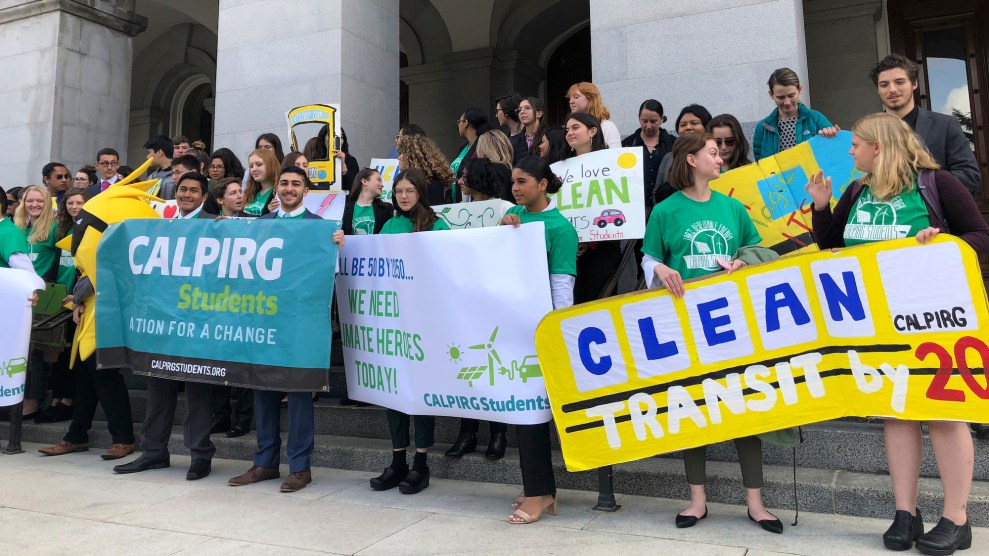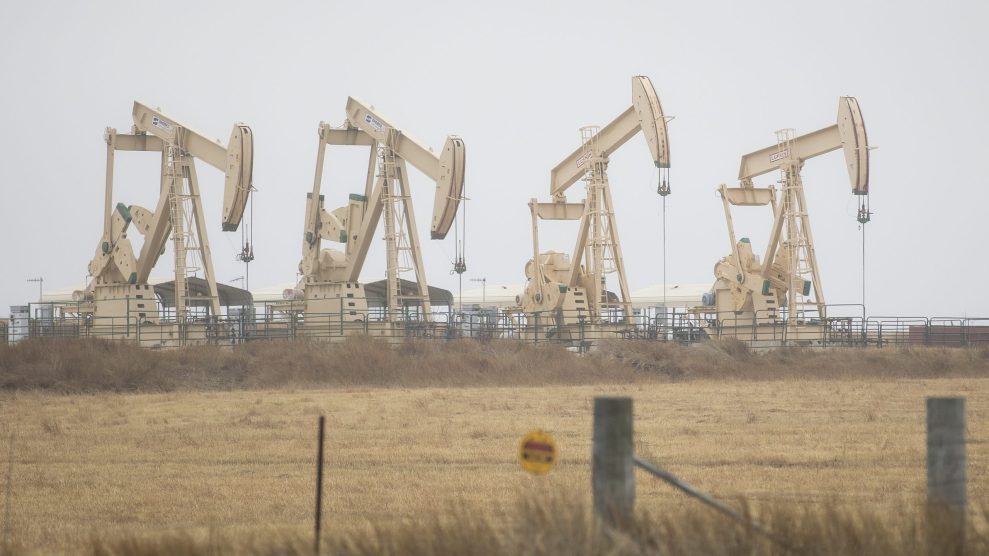
Milo Hess/Zuma
This story was originally published by the Guardian and is reproduced here as part of the Climate Desk collaboration.
Campus organizers at three universities filed legal complaints on Monday arguing that their schools’ investments in planet-heating fossil fuels are illegal, the Guardian has learned.
The students from Columbia University, Tulane University, and the University of Virginia each wrote to the attorneys general of their respective states calling on them to scrutinize their universities’ investments. They accuse their universities of breaching the Uniform Prudent Management of Institutional Funds Act, a law adopted by 49 states that requires nonprofit institutions to consider their “charitable purposes” when investing, and exercise “prudence” and “loyalty.”
“[T]he privileges that Columbia enjoys as a non-profit institution come with the responsibility to ensure that its resources are put to socially beneficial ends,” the Columbia students wrote.
Investments in coal, oil, and gas violate each of the three schools’ stated missions and pledges to prioritize climate action and research, the complaints say. From a purely financial standpoint, investments in fossil fuel stocks are also volatile, the students argue.
“Despite the demonstrable financial and social benefits of institutional fossil fuel divestment, the Board has remained steadfast in its support of an industry whose business model is based on environmental destruction and social injustice,” the University of Virginia students wrote.
The investments from influential, moneyed institutions set a dangerous example, the students say.
“Universities occupy a unique position as a bastion of values and morals the best of society should strive for,” said Nicole Xiao, 19, a second–year Columbia student studying climate systems science. “When Columbia refuses to commit to divestment, it hinders those very same principles and continues a blatant disregard of the important climate work its own faculty, students, and affiliates do.”
The complaints, filed on Earth Day, come as officials at Columbia University face staunch criticism for directing New York City police to remove students protesting against Israel’s war in Gaza and calling on Columbia to divest its finances from corporations with links to Israel.
“In light of current campus events occurring at Columbia, this complaint further highlights the University’s responsibility to uphold stringent standards on socially responsible and ethical investments, with respect to fossil fuels and beyond,” said Xiao.
The filings are each signed by faculty, staff and alumni, as well as local, national and international climate organizations. They estimate that the three schools each have millions of dollars invested in coal, oil, and gas.
The students say their concerns are compounded by “conflicts of interest” on each of the three campuses. Staff and board members at each school accept payments for roles at fossil fuel companies, and polluting corporations have also funded research at each of the three institutions.
The complaints build on pre-existing fossil fuel divestment efforts at each of the three universities, and follow 19 similar initiatives at colleges around the US filed over the past four years. They come amid increasing scrutiny of the role fossil fuel money plays in the US academy. On Sunday, the Guardian revealed that Louisiana State University had not only accepted major funding from oil major Shell, but also let the company weigh in on faculty research activities.
Bill McKibben, the veteran environmental activist and author, supports the students’ efforts. He noted that Columbia University is where James Hansen, the US scientist who warned the world about the greenhouse effect in the 1980s, pioneered his study of the climate crisis. “It’s nuts that schools like these would try to profit off the climate crisis,” he wrote in an email.
Each of the filings was written with help from nonprofit environmental law organization Climate Defense Project.
State officials have not affirmed any of the legal filings yet, but students have met with state officials in Massachusetts, Connecticut and New Mexico, Alex Marquardt, executive director of the Climate Defense Project, said. Several schools—including Harvard, Cornell, and Princeton—also voluntarily committed to divest from fossil fuels shortly after complaints against them were filed, he noted.
Maille Bowerman, 21, a senior at the University of Virginia who studies urban planning and environmental studies and organizes with DivestUVA, said student organizers on her campus think the filing is a “next step in getting our message through to the university and showing that the situation is urgent and requires drastic action.”
The students from each of the universities noted that the climate crisis—primarily caused by fossil fuels—had devastated each of their institutions’ home cities. These effects have been especially severe in Tulane University’s city of New Orleans, Louisiana, which is “arguably one of the cities most imperiled by the climate crisis in the United States,” said Emma De Leon, 20, a junior who is majoring in environmental studies and communication.
“The fossil fuel industry’s actions and infrastructure accelerate coastal erosion, which in combination with rising sea levels could result in New Orleans and Tulane’s campuses being inundated in the future,” said De Leon, who organizes with the sustainability and divestment committee of the Tulane Undergraduate Assembly. “During this semester alone, there have been two flooding events on campus that resulted in me either walking through water up to my calves or being stuck inside a building.”
Thomas Sherry, professor emeritus at Tulane University’s department of ecology and evolutionary biology, who signed the complaint, said the school has refused to divest from fossil fuels in its portfolio since he started his job on the campus in 1989. Even Hurricane Katrina, which struck New Orleans in 2005 and was one of the deadliest hurricanes in US history, did not prompt officials to take the leap.
“I understand that taking bold action, essentially against fossil fuels, is politically perilous in Louisiana, but I also would have expected more leadership from Tulane administration and trustees,” he said. “It’s ethically immoral at this juncture for institutions like Tulane to ignore its own contributions to, and inactivity regarding, climate change threats.”
The Guardian has contacted officials at Columbia University, Tulane University, and the University of Virginia for comment.
















